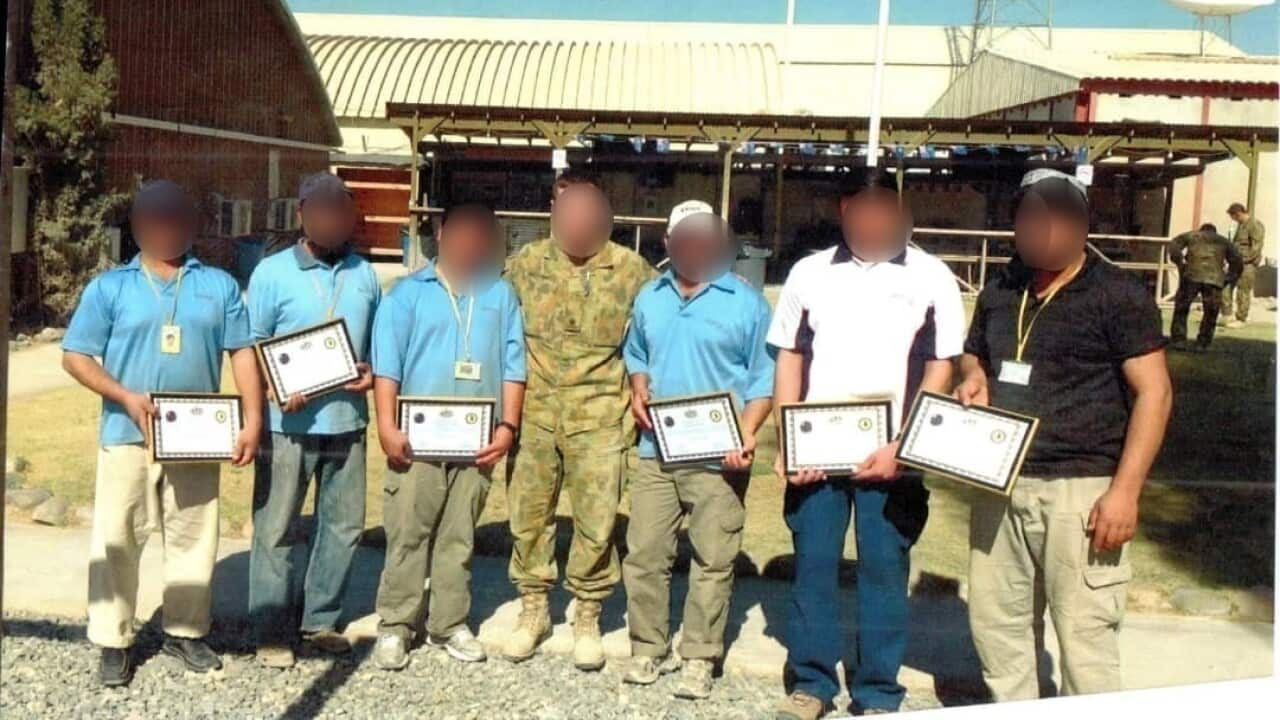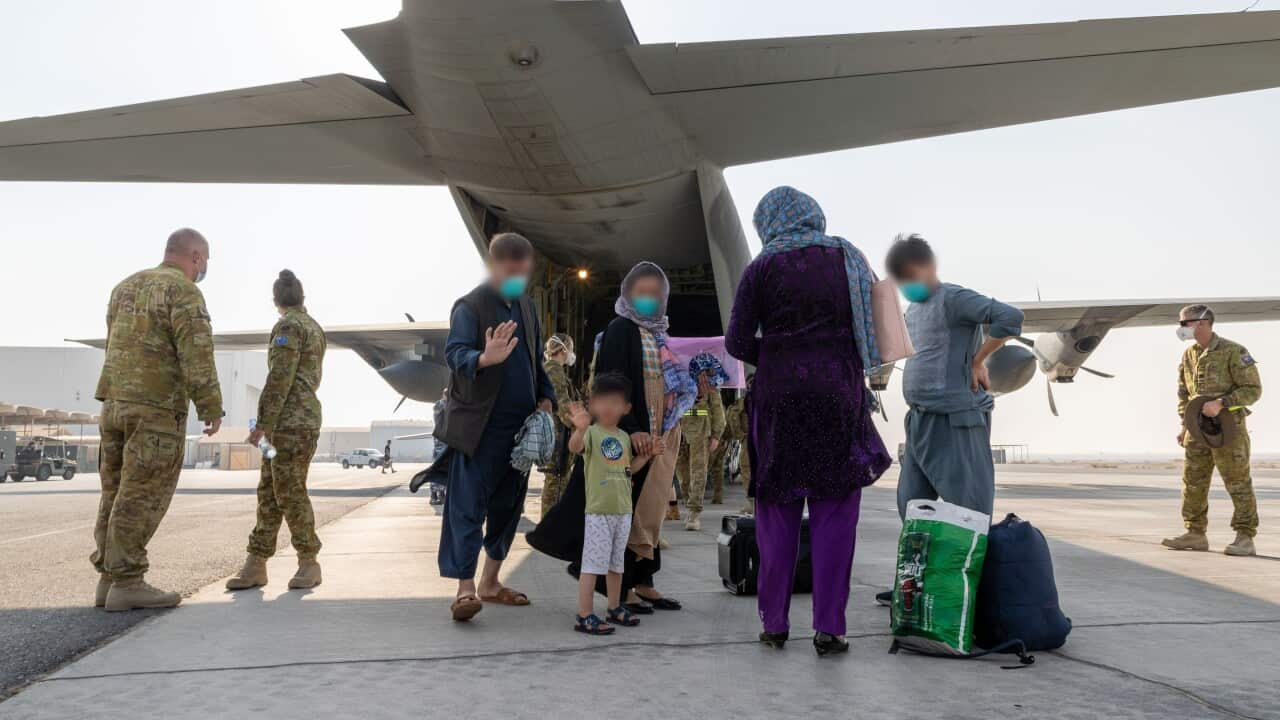Highlights
- Wali*, an Afghan contractor for the ADF, says he's at risk of attack after the Taliban searched his home in Kandahar.
- He’s calling on the federal government to “prioritise” the evacuation of Afghans who worked alongside Australian forces.
- A Taliban spokesperson says "there is no danger" for Afghans who worked with foreign forces.
As an Afghan cleaner working alongside Australian forces at the Kandahar Air Field from 2011 to 2014, Wali* lived in hope for brighter days in his country.
But seven years after leaving his post, he tells SBS Dari he’s living in fear that the Taliban will target him if he leaves his home in Kabul.
Taliban fighters recently notified Wali's parents they were searching for him and his brother Khalid*, who worked as an interpreter for Dutch and Australian forces, in Uruzgan and Kandahar, respectively.
Khalid managed to board a Dutch evacuation flight out of Kabul in August, and Wali is calling on the Australian government to continue its efforts to help people like him flee Afghanistan.
SBS News:
The Australian evacuation effort from Kabul airport ended in late August, and the
“I am not going out of the house here [in Kabul] because I have this fear that many Taliban [fighters] from Kandahar came here and if I go outside, they will identify me,” Wali says.
"My request to the government of Australia is that we should be given priority. We worked with them and our lives are in danger because of them."
Wali left his job in 2014 due to Taliban threats and began the process of obtaining asylum in Australia.
He lodged a certification application with the Australian Defence Force in May that year – the first step in the two-phase asylum process - but was rejected just two months later, over what he believes was due to his job.
He applied again in June 2021 as the security situation in the country began to deteriorate and was notified by email that the Home Affairs department would be in touch regarding the next steps and evacuation.
SBS Dari understands that a number of former interpreters who were rejected received similar emails before obtaining Subclass 449 temporary humanitarian visas.
‘They broke the lock and fired on the main gates’
When the Taliban attacked Kandahar in early 2021, Wali and Khalid fled to Kabul.
Wali says due to heavy fighting near their Kandahar home, the remaining family members locked up the house and made for a different part of the city.
However, when the Taliban entered Kandahar, the family quickly returned to the home.
“The day after the Taliban took control of Kandahar, my parents and brother returned home and they saw the Taliban in front of the house and noticed they broke the lock and fired on the main gate of the house,” he says.
“They walked into the rooms of the house [to search] but hadn't done anything else.” Wali says Taliban fighters didn’t distinguish between interpreters and employees of foreign forces.
Wali says Taliban fighters didn’t distinguish between interpreters and employees of foreign forces.

The front gate of Wali's family home in Kandahar with bullet holes evident. Source: Supplied by source
“They informed my father that 'we want to talk to your sons who were interpreters, and they should be here when we come next time'.
“The majority of the people of our village are working with the Taliban, most of them lost their father or brother in the war and they are very angry, they look at everyone as a spy.”
He temporarily returned to Kandahar as a final option when his brother left Afghanistan.
“When [Khalid] left, I faced financial hardship and I had only money to travel to Kandahar.
After I returned home, when I met my parents, they got angry at me, and they asked me why I returned home. They said 'the Taliban are searching for you and your brother'.
‘There is no danger to you’
Ahmadullah Wasiq, the deputy of the Taliban's cultural commission, tells SBS Dari claims that members of the group had entered houses “are not true”.
"When the Islamic Emirate’s Mujahideen (Taliban) entered Kabul. Some profiteers may have taken advantage of their name and entered people's houses," he says.
"It's been ordered to the Mujahideen of Islamic Emirates, that they cannot enter someone's house.
"They [Taliban] cannot enter or search their houses. If they are suspicious, they can ask people and discuss it with them." Despite the stance, Wasiq says Taliban forces "have the ability" to enter homes.
Despite the stance, Wasiq says Taliban forces "have the ability" to enter homes.

Ahmadullah Wasiq spoke to SBS in late August. Source: SBS Pashto
"I am telling [former workers of foreign forces] with confidence to stay at their home, stay in the country," he says.
"Do not try to leave, there is no danger to you."
Jason Scanes from Forsaken Fighters Australia (FFsA), a group assisting with the asylum applications of former Locally Engaged Employees in Afghanistan, says his organisation received reports of homes being searched during the Taliban advance across the country.
“The historical reprisals exacted against anyone who assisted coalition forces and facilitated missions against the Taliban, gives little confidence to those remaining, that they will not be targeted into the future.
“FFsA has information and documentation that approximately 800 interpreters and other Locally Engaged Employees and their families remain at risk in Afghanistan.”
Mr Scanes says his group remains “deeply concerned” for those remaining in Afghanistan.
“As evacuation operations have now concluded and commercial options have not resumed, many who fled their homes in fear of reprisals from the Taliban now remain vulnerable with little certainty for their safety into the future.
“FFsA requests that the Australian government ensure that those interpreters and Locally Engaged Staff have immediate options available to enable current visa holders to be evacuated from neighbouring countries like Pakistan/Iran. That those individuals and their immediate family receive all available assistance from consulates in those neighbouring countries to facilitate travel.”
Amnesty International Australia campaigner Nikita White says her organisation is “incredibly concerned” over disturbing reports of the Taliban conducting door-to-door searches for human rights defenders and journalists.
“One report suggests the Taliban shot dead a family member when they could not find the journalist they were searching for.
Recent evidence Amnesty International gathered revealed how Taliban fighters massacred nine ethnic Hazara men after taking control of Afghanistan’s Ghazni province last month.
“These brutal killings likely represent a tiny fraction of the total death toll and abuses inflicted by the Taliban to date, as the group has cut mobile phone service in many of the areas they have recently captured, controlling which photographs and videos are then shared from these regions.”
Ms White says Amnesty is particularly concerned that many Afghans are at risk of reprisal attacks due to their work with Australian forces.
“Many of those who worked with Australian men and women are still in Afghanistan and were not evacuated.
“We call on the Australian government to ensure all locally engaged Afghan civilians that worked with Australian personnel are given humanitarian visas, and that the Australian government continues to push for neighbouring countries to allow those at risk to leave Afghanistan.”
The Department of Home Affairs did not immediately respond to a request for comment.
*Not his real name.







